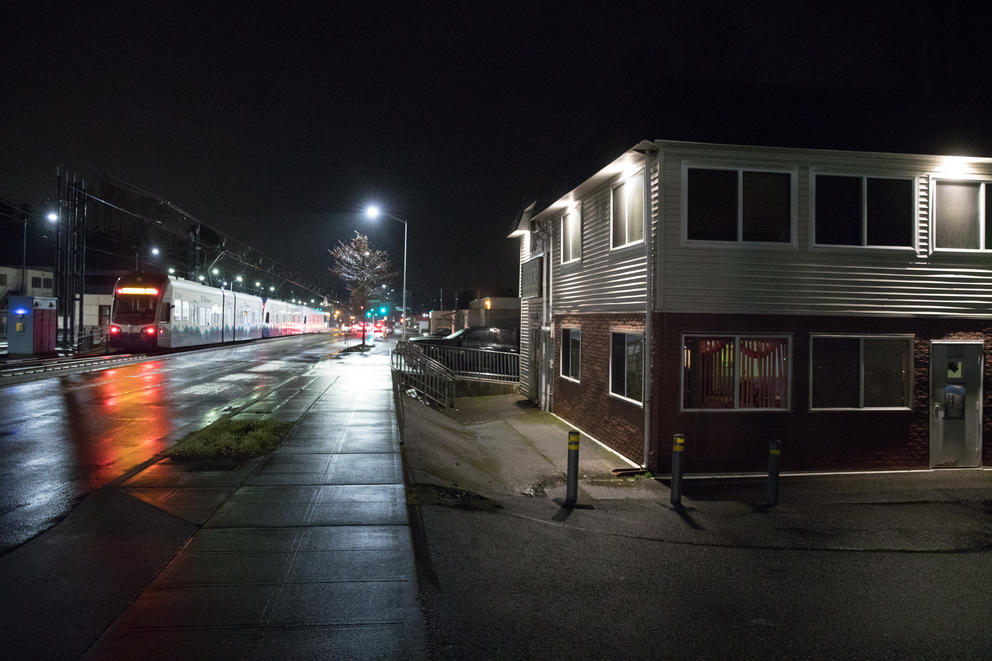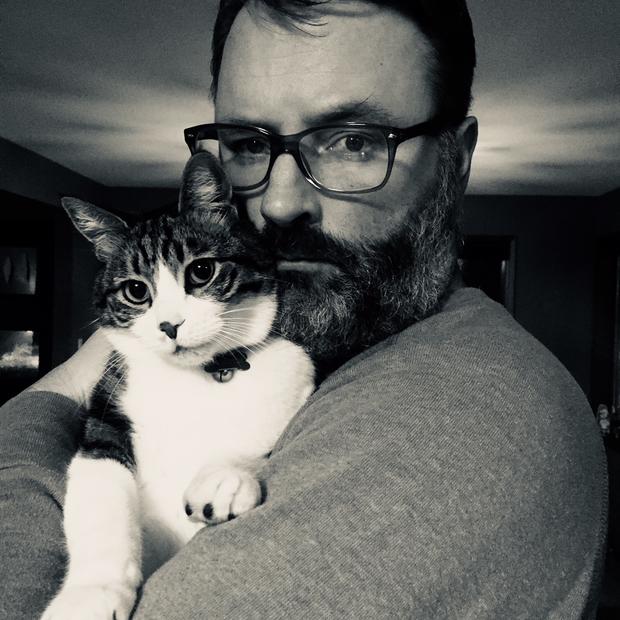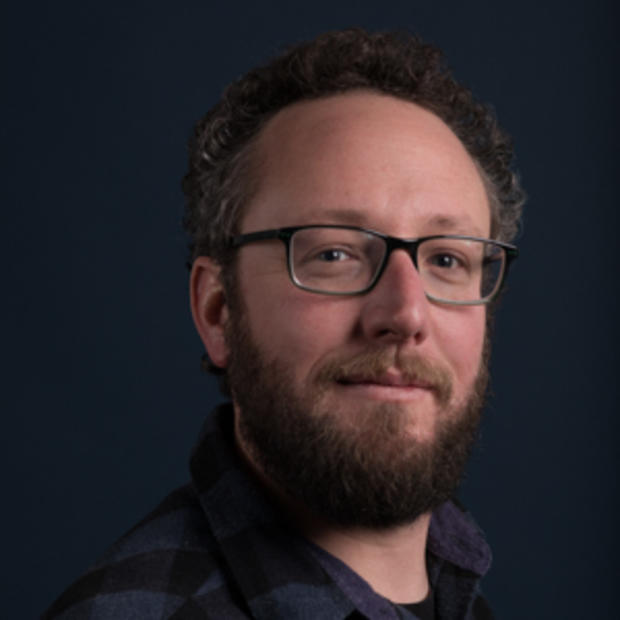When you purchase Crown Royal at the store, it comes in a regal-looking purple bag with gold stitching. These bags aren't meant to be discarded; they're meant to be reused, to be passed down through generations. Their functions can range from utilitarian — Brooks uses them to store iPods, change, darts and playing cards — to celebratory. Think about it: Would you rather get a wad of birthday cash from your grandfather in an envelope, or would you rather receive it in a Crown Royal bag? You'd rather receive it in a Crown Royal bag, 100 times out of 100, and we should all be so lucky to live so long.
The older Brooks gets, the more unfamiliar Seattle feels to him and his older African-American peers, who’ve fled historically Black neighborhoods for the suburbs in droves as one of their south-side social institutions fights for survival.
If you're driving southbound on Martin Luther King Jr. Way at night, Sound Transit trains rumble alongside you, and the strip malls, gas stations and salons give way to an industrial abyss at about South Henderson Street. On the left is a boxy building with a buck-head logo and "ELKS" spelled out in all caps. From the front, it's not entirely clear that it's open. Hit the button by the side door, though, and you'll be buzzed in.
(L to R) Longtime member J.R. Bonds, chapter president Maurice Blacknall and longtime member Al Brooks gather at the bar for beverages and conversation at Cascade Lodge No. 1416 in Seattle's Rainier Beach neighborhood, Feb. 23, 2019. Under Bonds' stewardship as former chapter president, the Elks Lodge paid off its mortgage and now owns the building.
To get to the bar of Cascade Lodge No. 1416, you pass through a modest, low-slung dining room with well-worn carpet and vinyl-backed chairs. There's a kitchen to the right, with cooks whipping up hot links, wings, catfish and pork-chop sandwiches. In the barroom, the clack of dominoes emanates from a corner table, as a few patrons play darts. A blue light flashes whenever anyone buzzes to gain entry, and all folks — even nonmembers — are welcome, provided they remove their hats. Around suppertime on a recent Saturday, old-school R&B is on the stereo and a Dallas Cowboys playoff game on the TV above all the bottles, near a mounted elk’s head.
Amid all this, we encounter Brooks, sipping on a glass of Crown Royal poured by bartender and Daughter Ruler Gaye Spearman. (Her medieval bad-ass title indicates that she heads up the lodge’s women’s auxiliary.) Spearman is a Kent resident whose grandfather started an Elks lodge in Yakima.
Brooks hails from Texas, so he's rooting for the Cowboys. (They would go on to lose to the Los Angeles Rams.) He attends church close to Garfield High School and used to live near there. He lives in Auburn now, but still treks north to the lodge two or three times a week.
Brooks' first exposure to the Cascade lodge was as a DJ. "All of a sudden, I decided to become a member," he says. "It was wholesome, friendly — you didn't have to watch your back."
Before Brooks knew it, he was elected Exalted Ruler, the lodge's foremost male leadership post. (Maurice Blacknall, a former Seattle resident and longtime Boeing employee who now lives in Renton, currently holds that title.) Brooks was impressed by the stream of successful African-American professionals the lodge brought in for chats, and membership was robust through the early 2000s. But when Sound Transit effectively forced the lodge into selling a portion of its land for the widening and rejiggering of MLK Way, Brooks says, "We lost a lot of business. People used to be able to cross over Empire Way [MLK Way’s previous moniker]. Now they have to go down and around [the train tracks]. And they took away a lot of our parking."
Hence, a predominantly African-American membership that peaked at about 200 two decades ago has dwindled to fewer than 50. Such is the story of Seattle, a city that's seen its multigenerational African-American population dissipate, rendering such historically Black neighborhoods as the Central Area and Columbia City virtually unrecognizable to anyone who was around to witness what they were like before the 21st century.
"The Black population has headed south to Renton, Kent and beyond," says Roberto Jordan, a veteran firefighter who lives in upper Rainier Beach and is the president of Columbia City's Royal Esquire Club. He adds that "nothing" has replaced popular African-American watering holes like Angie's Tavern and Thompson's Point of View because "the folks going to those places were of a different age group, so they're not going out anymore, period."
Like the Cascade Elks, the Royal Esquire Club was founded by a group of African-American men who, at the time, were barred from traditional, white-run fraternal organizations. These new groups forged their own path in the face of racism, and established vital gathering spaces for Blacks seeking basic services and a safe social outlet as the civil-rights movement took flight.
In this country, there are two distinctive strands of Elks Club. Started after the Civil War, the Benevolent and Protective Order of Elks (BPOE) originally didn't admit African-American members. That prompted Blacks to form their own organization, the Improved Benevolent and Protective Order of Elks of the World (IBPOEW). Both organizations are now open to all races, but they continue to operate as separate entities, with little cross-pollination. "God knows what they were thinking back then," Rick Gathen, the BPOE's national marketing manager, says of his organization's regrettable racial underpinnings. "That was the history of the nation. We now live in a much more welcome environment where people respect what you have in your heart and couldn't care less about your race or gender or sexual preference. We have no tolerance for people who have hatred in their heart."
As other fraternal organizations have struggled to attract new members, the BPOE is "pretty much break even, which is an accomplishment in this day and time," says Gathen, who credits "bricks and clicks" — the lodges themselves and their online presence — for this lack of attrition. He says Washington state lodges, in particular, have launched successful recruiting initiatives — none more impressive than that of the Ballard Elks Lodge, which boasts a jaw-dropping 1,898 members.
"We've basically been growing by 20 percent a year," says the lodge's former exalted ruler, Ben Braden, who acknowledges that his lodge's waterfront location on Shilshole Bay is a pretty enviable calling card. "We're the fastest-growing and youngest lodge in the nation. There's a lodge that's younger, but they're not growing."
Nor is the Cascade Elks Lodge, but Exalted Ruler Maurice Blacknall isn't panicking. He says, "Membership will rise and fall. It will get near death and come back again. I think it's a generational thing."
Like Spearman, Blacknall was exposed to an Elks lodge as a child and stuck with it. Growing up in North Carolina, he says, "We used to go there as teenagers, but as long as we behaved ourselves, they let us stay."
Like many of his brothers and sisters at the lodge, Blacknall now resides in south King County. He used to live in the Central Area, but says, "I don't even go to that area anymore." Blacknall tried to get his 33-year-old son and some of his friends to join the Cascade lodge, but says, "They aren't attracted to structure and policies and all that crap." So what is the attraction? Why endure the hassle of joining a fraternal organization when you can just shoot the breeze at the barbershop or a local bar?
"Serving the community and forming a relationship with people you might or might not have something in common with" is what appeals to Blacknall, who adds, "People like coming here because they feel safe. And we pour a stiff drink."

















